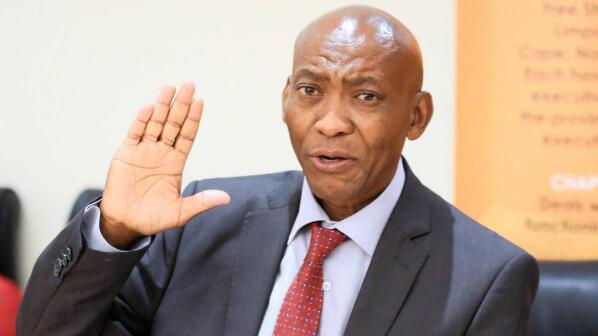Sol Plaatje Municipality tabled its 2018/19 annual report this month following Covid-19-related delays.
SOL PLAATJE executive mayor Patrick Mabilo was listed as the councillor with the highest municipal account that was in arrears, to the amount of R218,817 as of June 30, 2019.
The Sol Plaatje Municipality’s annual report dated 2018/19, which was only tabled this month, indicated that the account was outstanding for more than 90 days.
The councillor with the second highest consumer account was DA councillor Surech Kika, who is also the sheriff of the court in Barkly West.
Hewas was in arrears to the amount of R140,795 .
The total amount owed to the municipality by councillors on consumer accounts as of June 30, 2019 amounted to R494,556.
The municipal public accounts committee (MPAC) explained that consultation processes were stymied due to the Covid-19 pandemic, resulting in delays in tabling the annual report.
“Due to the national proclaimed pandemic of Covid-19, no public meetings and MPAC committee meetings were held.”
According to the committee, the annual report was distributed in February 2020.
The municipal manager indicated that the municipality’s financial health was in a “critical state”, where outstanding debts amounted to R2.4 billion.
“For the fourth quarter of the financial year the municipality barely stayed afloat as the cash and cash equivalents reached critical levels. This was exacerbated by a below target collection rate.
“ Inadequate cash reserves pose a risk not only to the settlement of creditor’s invoices, while service delivery and staff salaries become a concern.”
It was stated that the cash flow of the municipality was under “severe pressure”.
“This is the third consecutive year that a decrease in the cash balance was realised .This financial year the decrease has been very significant, with a decrease of R61 million.”
The municipality incurred R53.2 million irregular expenditure that was found to be non-compliant with the supply chain management regulations and was under investigation.
Debt owed by organs of state amounted to R829 million as of June 30, 2019.
“Water and electricity losses remain a concern. The municipality experienced water shortages for a significant part of the 2018/19 financial year, where stage 5 water restrictions were implemented. At the time, the water demand exceeded the maximum pumping and supply capacity.”
The municipal manager added that the construction of the new sewerage line from Gogga pump station to the Homevale Water Waste Treatment plant would provide relief to households that had been affected by sewage flooding in the Redirile and Homevale areas.
“It will further increase the sewage intake capacity for treatment purposes at the Homevale treatment plant.
“Overhead electrical lines have been installed at the Gogga pump station. This enabled the pump station to return to normal after repeated cable theft.”
It was pointed out that the infrastructure of the city was “very old, retrofitted with time and buried under other structures with no accurate “as built information”.
“This poses a challenge with maintenance and upgrading of infrastructure for all basic services.
“Electrification remains a challenge due to continuous growth of informal settlements on vacant land. Electrical infrastructure and the electrification of houses cannot be installed in informal settlements prior to township establishment.”
The municipality attributed delays in attending to water problems to the shortage of personnel and an inability to manage crews.
“Aged infrastructure also contributes to high water leaks in the water reticulation network. The network still comprises old asbestos pipes. The pipe replacement project meant to replace aged infrastructure was not realised successfully, due to financial constraints and diminishing municipal capital replacement reserves.”
It pointed out that the new pump station at Riverton had not eliminated water challenges completely as major work still needed to be done on the refurbishment of the abstraction facility, old pump station, water storage facilities in Roodepan, Southridge and Newton.
The municipality stated that the increase in informal areas posed a major challenge, where growth outpaced the funding made available to eradicate service backlogs.
It stated that there were 5,602 electricity backlogs and 22,000 housing backlogs.
The municipality rated the level of access to road infrastructure in the district as being “satisfactory”.
“Among all road classes and surface types, tarred roads are the most deteriorated, with potholes, rutting and aggregate loss highly visible. This is mainly due to routine maintenance carried out over the past 15-20 years or so being less than the minimum maintenance required to sustain and conserve road infrastructure. This has caused a great backlog in the maintenance of tarred roads, resulting in the deterioration that we now sit with.”
It added that financial constraints only permitted the patching of potholes.
It was reported that the management of stormwater drainage also remained a major challenge.
“The city has grown exponentially over the years, resulting in additional surface run-off, thus requiring upgrading of stormwater infrastructure to accommodate additional discharge. The structural integrity of the Tlhageng Retention Dam remains the biggest threat as it forms an integral part of the stormwater network in Galeshewe. In order to address this risk, the upgrading of the dam is paramount.
“Maintenance of stormwater infrastructure also remains a great challenge as available personnel resources, the yellow fleet machinery at our disposal is inadequate to deal with the maintenance of stormwater infrastructure, specifically the cleaning of major stormwater canals and the unblocking of catch pits.”








